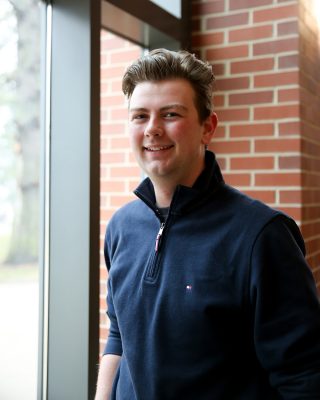Engineering graduate Allen ’22 valued project-based study
Every year Cornell College celebrates its graduates at Commencement with their closest friends and families. We also like to highlight a number of graduating seniors online as they transition from college student to college grad and join Cornell’s growing community of alumni.

Tanner J. Allen
Bachelor of Science in Engineering (B.S.E.)
Hometown: Manito, Illinois
Next: Working for Tesla’s Service Engineering Department in Austin, Texas
“Real-world job training does not take place on a semester plan, so why not learn in the same way you will be expected to work?”
What do you think you’ve learned since being at Cornell that you did not know before you arrived?
Since arriving at Cornell College, I have learned to work hard and work quickly. While I knew these traits were important before arriving at Cornell, the coursework in all of the departments I have been fortunate to study within has proven to be difficult given such a unique timeframe. Because of this constraint, you learn that it is often best to work extremely hard to complete things on time. This is especially prevalent in the engineering curriculum where things are bound to fail: a 3D printer will break, the high-powered laser power supply will malfunction, and things will eventually go wrong. Cornell taught me to accept that failure happens, and it is inevitable. For this reason, it is paramount to address these failures or setbacks early to allow more time to correct them.
Who helped you along your college journey?
Professor of Engineering Niloofar Kamran and Professor of Engineering Brian Johns have been instrumental mentors guiding me through my education at Cornell College. While many of my ambitions seemed far-fetched, they were always there to support me with anything I needed to get to where I wanted to be. Because of their support, I was able to fulfill a year-long dream internship at Tesla, where I currently work remotely, while attending full-time classes on campus. In addition, Professor Kamran and Professor Johns encouraged me to step out of my comfort zone and accept a civil engineering internship in Downtown Los Angeles: A location that would have scared the hell out of the small-town midwestern Tanner that started at Cornell College just four years earlier. While many would have encouraged me to have more ‘realistic’ goals, these two supported me and taught me much of what I know about engineering, and for that, I am so, so thankful.
Describe the block plan.
Cornell College’s block plan is designed to immerse students in their studies by allowing them to focus on one subject for a set period of time. This method of learning ensures students walk away from the course with a cohesive understanding of the material due to the linear nature of the lessons. Unlike traditional semester schedules, students do not have to prioritize which courses they are studying for. Instead, they give the course they are in their all until it is time to move on to the next block! This project-based and focused system of learning has been consistently found throughout all of the professional teams I have been fortunate to work with. Real-world job training does not take place on a semester plan, so why not learn in the same way you will be expected to work?
What is your advice to the classes behind you?
My biggest advice is to put yourself out there. It is difficult and it is very uncomfortable; however, the personal growth and pride of doing something you never thought was possible far outweighs the summation of all the prior fear and anxiety. In the words of Ted Lasso, “Taking on a challenge is a lot like riding a horse, isn’t it? If you’re comfortable while you’re doing it, you’re probably doing it wrong.”
Tags: engineering



